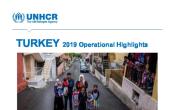Turkey
Operation: Turkey
Location
{"longitude":35,"latitude":39,"zoom_level":0,"iso_codes":"'TUR'"}
By clicking on the icons on the map, additional information is displayed.
The boundaries and names shown and the designations used on this map do not imply official endorsement or acceptance by the United Nations.
Key Figures
| 2020 planning figures | |
| 225,000 | people of concern will be assessed for vulnerability |
| 99,580 | people with specific needs will receive cash grants |
| 65,000 | people of concern will be enrolled in language classes |
| 18,500 | people will be provided with legal assistance |
| 2,430 | people of concern will be enrolled in UNHCR-supported tertiary education programmes |
| 2018 year-end results | |
| 1.75 mn | The registration records of over 1.75 million Syrians with temporary protection were updated and verified |
| 252,700 | vulnerable people were assisted with cash for protection, emergency assistance, and food and non-food items, of which some 192,000 were Syrian refugees under Temporary Protection and 60,700 persons of other nationalities under International Protection |
| 16,040 | cases were submitted for resettlement consideration |
| 6,500 | refugee students benefitted from higher education preparation programmes |
Latest Updates and Related Links
People of Concern
2%
Decrease in
2019
2019
| 2019 | 3,907,789 |
| 2018 | 3,993,522 |
| 2017 | 3,789,320 |

[["Refugees",3579531],["Asylum-seekers",328257],["Stateless",1]]
Loading ...
Turkey
< Back
2019
{"categories":[2015,2016,2017,2018,2019,2020],"budget":[336.38575258,350.92322574,367.991774618,436.06747785,390.55227945,369.48280454],"expenditure":[82.07968733,126.86572147,149.46951107,123.08865392,123.50199287,null]}
{"categories":[2015,2016,2017,2018,2019,2020],"p1":[336.31575258,350.87922574,367.988984618,436.06468785,390.54727945,369.47780454],"p2":[0.07,0.044,0.00279,0.00279,0.005,0.005],"p3":[null,null,null,null,null,null],"p4":[null,null,null,null,null,null]}
{"categories":[2015,2016,2017,2018,2019,2020],"p1":[82.06007284,126.86331129,149.46672107,123.08803392,123.50037287,null],"p2":[0.01961449,0.00241018,0.00279,0.00062,0.00162,null],"p3":[null,null,null,null,null,null],"p4":[null,null,null,null,null,null]}
Loading ...
CHOOSE A YEAR
- 2014
- 2015
- 2016
- 2017
- 2018
- 2019
- 2020
Year-end Overview
Working environment
The conflict in Syria continues to be the cause of the largest number of displaced people and refugees in the world today. In September 2018, 5.64 million Syrian refugees were registered in the neighbouring countries, of whom over 3.6 million were in Turkey. In addition, Turkey is currently hosting some 360,000 refugees and asylum-seekers from countries other than Syria, mainly from Afghanistan, Iraq and Iran.As the conflict in Syria continues, the level of vulnerability of Syrian refugees continues to increase. The resources refugees had when they first fled have long since been exhausted and the needs of refugees are posing increased strains on the national systems and resources of host countries and communities. While the humanitarian response in the countries around Syria continues and international support remains high, actors are only able to address the most pressing needs. Efforts are being made to boost capacity of national institutions, and a positive impact is starting to be seen in the resilience of the communities in Turkey and within the region at large.
As a result of increasing vulnerability, onward movements to Europe continue even if in significantly smaller numbers than before.
The Government of Turkey continues to lead the protection of and assistance to refugees and asylum-seekers in Turkey demonstrating strong ownership of the response.
Key priorities
On the basis of the national legal framework for international and temporary protection holders, UNHCR will promote protection-sensitive border management and access to protection for people of concern, including by improving access to information and legal assistance. UNHCR will continue to support the Directorate General for Migration Management (DGMM) with registration of Syrian refugees and in efforts to develop the national asylum-system, including registration and refugee status determination (RSD) procedures for people seeking international protection in Turkey.UNHCR will continue to advocate and support the inclusion of refugees into national systems, by strengthening cooperation with line ministries and institutions at national, provincial and local levels and by providing technical and capacity-building support. While inclusion into national services is a priority in all sectors, UNHCR’s specific emphasis will be on child protection, the prevention and response to sexual and gender based violence (SGBV) and the identification of and support to refugees with specific needs. UNHCR will increase its support to local authorities, including municipalities, with a view to promote social cohesion and strengthen provincial referral mechanisms. With regard to education, UNHCR will continue to focus on higher education, through the provision of scholarships, and advanced academic Turkish language classes. It will work together with livelihoods partners to establish a pathway “from learning to earning”.
UNHCR and its partners will focus on the identification of persons with specific needs and the most vulnerable. Where financial assistance is deemed to be an adequate response to protection concerns or to meet specific needs, UNHCR has revised its multi-purpose cash assistance to focus on persons with specific needs, not covered by the Emergency Social Safety Net (ESSN), as a means to prevent and respond to protection risks.
With self-reliance being a precursor to any durable solution, UNHCR will continue livelihoods support for people of concern to become active economic actors, and it will play a catalytic role in engaging development partners, international financial institutions, and the private sector to expand livelihoods opportunities for refugees. UNHCR will continue to advocate for resettlement and safe pathways for both Syrians and refugees of other nationalities and undertake resettlement processing. While conditions are not yet in place for voluntary repatriation in safety and with dignity to Syria, UNHCR will continue to monitor the voluntary nature of spontaneous returns, as well as population movement trends along the border.
As more than 90 percent of refugees in Turkey live among the host community, UNHCR will consolidate its community-based and outreach approaches and support communication with refugee and host communities. UNHCR will endeavor to expand partnerships and coordination will be mainstreamed in all activities to ensure the engagement of a broader range of actors. Under the One Refugee Policy, the harmonisation of assistance will continue to be a priority, in particular between Syrians and refugees and asylum-seekers of other nationalities.

























